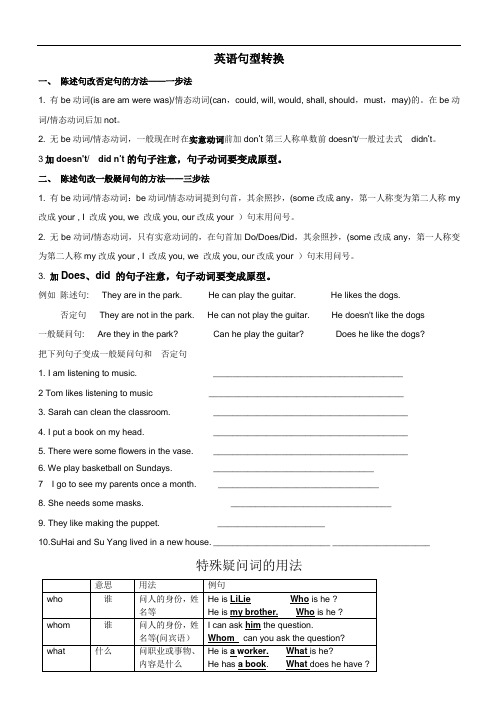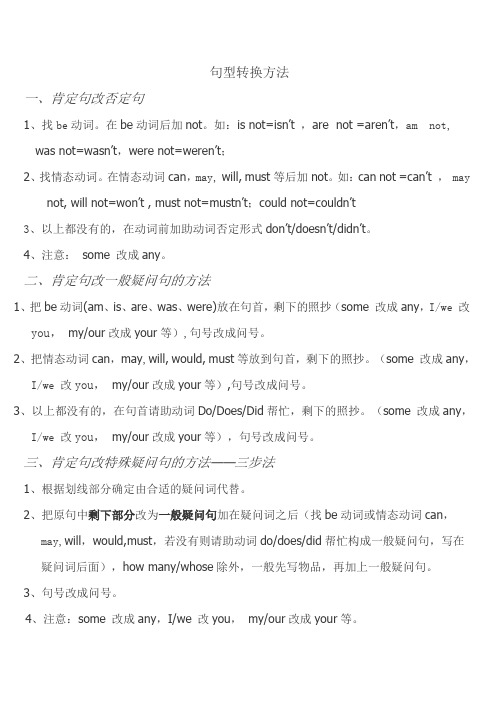句型转换
英语句子转换类型及方法

英语句子转换类型及方法
一、英语句子转换的类型
英语句子转换可以分为两种类型:句型转换和句式转换。
1. 句型转换
句型转换是指将一个句子的结构转换为另一种结构,但语义不发生变化。
句型转换可以分为以下几种:
(1) 主语和谓语的转换
例如:She reads books. -> Books are read by her.
(2) 宾语和谓语的转换
例如:He gives me a book. -> A book is given to me by him.
(3) 形容词和动词的转换
例如:The book is interesting. -> The book interests me.
2. 句式转换
句式转换是指将一个句子的结构和语义都转换为另一种结构和
语义。
句式转换可以分为以下几种:
(1) 肯定句和否定句的转换
例如:He likes apples. -> He doesn"t like apples.
(2) 疑问句和陈述句的转换
例如:Does he like apples? -> He likes apples.
(3) 陈述句和感叹句的转换
例如:He likes apples. -> How does he like apples?
二、英语句子转换的方法
英语句子转换的方法可以分为两种:语法转换和语义转换。
1. 语法转换
语法转换是指通过改变句子的语法结构来实现句子的转换。
句子的转换有多少种形式

句子的转换有多少种形式文章一:句子的转换有多少种形式?对于句子的转换,我们可以采用多种形式,通过不同的方法改变原有的句子结构,以达到表达更加准确、生动的效果。
下面列出三个知识点并进行分析。
1. 句型转换的目的与方法句子的转换是为了表达更加准确、复杂的含义,或者为了让同一种表达方式更加生动、具有表现力。
句型转换的方法主要有以下几种:(1)主动变被动:通过将原有句子中的主语变为被动语态的主语,来表达出被动的意义。
例如,“Tom opened the door”可以转换为“The door was opened by Tom”。
(2)疑问变陈述:通过将原有疑问句中的语气改为陈述句,来表达出强烈的肯定或否定的意义。
例如,“Do you like pizza?”可以转换为“I like pizza”。
(3)倒装句:通过将原有句子中的谓语动词与主语倒置,来表达出强调、反问等意义。
例如,“I have never seen such a beautiful girl”可以转换为“Never have I seen such a beautiful girl”。
2. 句型转换的适用场景句型转换的适用场景主要有以下几种:(1)表达强调:通过强调某个词语或句子成分,来表达出强烈的情感或意义。
例如,“I didn't say you were crazy”可以通过倒装句,强调“you were crazy”,以表达出强烈的否定意义。
(2)表达比较:通过将原有句子中的成分进行比较,来表达出事物之间的差异或相似之处。
例如,“I like coffee more than tea”可以转换为“Tea is not as good as coffee”,以表达出两种饮料之间的比较。
(3)表达变化:通过改变句子中的时态、语态等成分,来表达出事物的变化趋势或发展方向。
例如,“He has been studying English for three years”可以转换为“He started studying English three years ago”,以表达出他学习英语的起点和变化趋势。
句型转换

英语句型转换一、 陈述句改否定句的方法——一步法 1. 有 be 动词(is are am were was)/情态动词(can,could, will, would, shall, should,must,may)的。
在 be 动 词/情态动词后加 not。
2. 无 be 动词/情态动词,一般现在时在实意动词前加 don’t 第三人称单数前 doesn't/一般过去式 didn’t。
3 加 doesn't/ did n’t 的句子注意,句子动词要变成原型。
二、 陈述句改一般疑问句的方法——三步法 1. 有 be 动词/情态动词:be 动词/情态动词提到句首,其余照抄,(some 改成 any,第一人称变为第二人称 my 改成 your , I 改成 you, we 改成 you, our 改成 your )句末用问号。
2. 无 be 动词/情态动词,只有实意动词的,在句首加 Do/Does/Did,其余照抄,(some 改成 any,第一人称变 为第二人称 my 改成 your , I 改成 you, we 改成 you, our 改成 your )句末用问号。
3. 加 Does、did 的句子注意,句子动词要变成原型。
例如 陈述句: 否定句 一般疑问句: They are in the park. They are not in the park. Are they in the park? He can play the guitar. He can not play the guitar. Can he play the guitar? He likes the dogs. He doesn't like the dogs Does he like the dogs?把下列句子变成一般疑问句和 否定句 1. I am listening to music. 2 Tom likes listening to music 3. Sarah can clean the classroom. 4. I put a book on my head. 5. There were some flowers in the vase. 6. We play basketball on Sundays. 7 I go to see my parents once a month. 8. She needs some masks. 9. They like making the puppet. _______________________________________ ________________________________________ ________________________________________ ________________________________________ ________________________________________ _________________________________ _________________________________ _________________________________ ______________________10.SuHai and Su Yang lived in a new house. ________________________ ____________________特殊疑问词的用法意思 who whom what 谁 谁 什么 用法 问人的身份,姓 名等 问人的身份,姓 名等(问宾语) 例句 He is LiLie He is my brother. Who is he ? Who is he ?I can ask him the question. Whom can you ask the question? What is he? What does he have ?问职业或事物、 He is a worker. 内容是什么 He has a book.which哪一个问一定范围内 特指的人或物 问所属关系The big box is mine. Which box is yours? The girl at the door is Ann. Which girl is Ann? This is her book. Whose book is this ? This book is hers. Whose is this book?whose what color What time when where why how谁的 什么颜色 几点 什么时候 什么地方 为什么 怎样问颜色(表语) My skirt is red. What color is your skirt? 问具体时间 问大致时间 We play games at five in the afternoon ? What time do you play games? We play games in the afternoon ? When do you play games?问地点(状语) We play games at home on Sunday ? Where do you play games on Sunday? 问原因 问健康状况、 做事的方式等 问年龄 跟复数名词, 问数量 跟不可数名词 问数量或价钱 问路程 问 in+一段时间 问一段时间, 问物体的长短 He isn't at school today because he is ill. Why isn't he at school today ? He is fine/strong. How is he ? I go home by bike. How do you go home? He is ten. How old is he ? There are thirty boys in my class. How many boys are there in your class? There is some milk in the bottle. How much milk is there in the bottle? It's five kilometers away from here? How far is it from here? He can finish it in half an hour. How soon can he finish it ? He has lived here for a year. How long has he lived here? The desk is one meters long. How long is the desk ? I go to see my parents once a month. How often do you go to see your parents?how old how many how much how far how soon how long多大几岁 多少 多少 多远 多快,多 久 多久how often多久 (一次)问频率How 的疑问句辨析 一、how many 和 how much 的区别 how many 用来询问可数名词的数量,它的句式是:How many+复数名词+一般疑问句+? how much 用来询问不可数名词的数量,也可询问价格。
小学语文八大句型转换

小学语文八大句型转换一、定义小学语文中,句子是语言表达的基本单位。
在学习语文过程中,学生需要掌握并正确运用八大句型,以使自己的语言更加丰富、准确、地道。
这八大句型分别是陈述句、疑问句、祈使句、感叹句、条件句、比较句、让步句和复合句。
本文将介绍这八大句型的基本特点,并针对每种句型进行转换练习,提升学生的语言表达能力。
二、陈述句转换陈述句是表达事实、陈述情况或观点的句子。
在转换陈述句时,可以采用以下方法:1.改变主谓结构:将句子中的主语和谓语调换位置,如“小明看电视”可以转换为“电视被小明看”。
2.加入时间状语:在句子中添加表示时间的状语,如“我爱吃水果”可以转换为“我每天都爱吃水果”。
3.加入地点状语:在句子中添加表示地点的状语,如“他正在学校读书”可以转换为“他正在图书馆读书”。
三、疑问句转换疑问句用于提问,探求事实或信息。
在转换疑问句时,可以尝试以下方法:1.改变句子语序:将疑问句中的语序进行调整,如“你吃了饭吗?”可以转换为“吃饭了吗,你?”。
2.使用否定词:在疑问句中加入否定词,如“你看到了没有?”可以转换为“你没有看到吗?”。
3.改变疑问词:将疑问句中的疑问词进行替换,如“你为什么不来?”可以转换为“你因为何不来?”。
四、祈使句转换祈使句用于表达请求、建议、命令等。
在转换祈使句时,可以考虑以下方法:1.改变语气:将祈使句转换为陈述句或疑问句,如“请关门”可以转换为“你能关门吗?”。
2.使用否定词:在祈使句中加入否定词,如“请不要打扰我”可以转换为“你能不要打扰我吗?”。
3.改变质疑方式:将祈使句中的建议或请求转换为质疑方式,如“请保持安静”可以转换为“难道你不应该保持安静吗?”。
五、感叹句转换感叹句用于表达惊讶、欣喜、赞叹等情感。
在转换感叹句时,可以尝试以下方法:1.改变程度词:将感叹句中的程度词进行替换,如“多么美丽的花啊!”可以转换为“真是美丽的花啊!”。
2.添加原因状语:在感叹句中加入表示原因的状语,如“这么好吃的蛋糕!”可以转换为“这个蛋糕真好吃呀!”。
句型转换方法

句型转换方法一、肯定句改否定句1、找be动词。
在be动词后加not。
如:is not=isn’t ,are not =aren’t,am not,was not=wasn’t,were not=weren’t;2、找情态动词。
在情态动词can,may, will, must等后加not。
如:can not =can’t ,maynot, will not=won’t , must not=mustn’t;could not=couldn’t3、以上都没有的,在动词前加助动词否定形式don’t/doesn’t/didn’t。
4、注意:some 改成any。
二、肯定句改一般疑问句的方法1、把be动词(am、is、are、was、were)放在句首,剩下的照抄(some 改成any,I/we 改you,my/our改成your等),句号改成问号。
2、把情态动词can,may,will, would, must等放到句首,剩下的照抄。
(some 改成any,I/we 改you,my/our改成your等),句号改成问号。
3、以上都没有的,在句首请助动词Do/Does/Did帮忙,剩下的照抄。
(some 改成any,I/we 改you,my/our改成your等),句号改成问号。
三、肯定句改特殊疑问句的方法——三步法1、根据划线部分确定由合适的疑问词代替。
2、把原句中剩下部分改为一般疑问句加在疑问词之后(找be动词或情态动词can,may,will,would,must,若没有则请助动词do/does/did帮忙构成一般疑问句,写在疑问词后面),how many/whose除外,一般先写物品,再加上一般疑问句。
3、句号改成问号。
4、注意:some 改成any,I/we 改you,my/our改成your等。
句型转换ppt课件

在句型转换时,应根据语境和表达需求选择适当的转换方式,如主动句变被动句、肯定句变否定句等 。通过灵活运用不同的转换方式,可以使句子更加丰富多样,增强语言的表现力。
注意句子语序的调整
总结词
在句型转换过程中,语序的调整是一个重要 的技巧。
详细描述
由于中文的语法结构与英语不同,在进行句 型转换时,需要注意语序的调整。通过合理 安排词语的顺序,可以更好地表达句子的意 思,并使句子更加符合中文的表达习惯。在 进行语序调整时,可以参考中文的语法规则 和习惯用法,以确保转换后的句子语序正确 、流畅自然。
示例
将“The cat sat on the mat.” 的主语转换为“A cat sat on a mat.”
谓语转换
谓语转换
改变原句的谓语动词,以表达不同的 语气或强调不同的重点。
示例
将“The dog chased the ball.”的谓 语转换为“The ball was chased by the dog.”
主语错误
主语缺失
主语与谓语搭配不当
在句子中没有明确的主语,导致句子 结构不完整。
主语和谓语之间缺乏逻辑关系或语义 联系。
主语错位
主语的位置不正确,导致句子意思表 达不清。
谓语错误
谓语缺失
句子中缺少谓语,导致句子结构不完整。
谓语错位
谓语的位置不正确,导致句子意思表达不清。
谓语与宾语搭配不当
谓语和宾语之间缺乏逻辑关系或语义联系。
句型转换ppt课件
目 录
• 句型转换简介 • 简单句型转换 • 复合句型转换 • 句型转换技巧 • 句型转换练习 • 句型转换常见错误与纠正
01
句型转换简介
英语句型转换方法归纳

英语句型转换方法归纳英语中,句子的表达方式有很多,句型转换是为了丰富句子结构并表达更准确的含义。
在学习英语的过程中,掌握句型转换方法是非常重要的。
本文将对常见的句型转换方法进行归纳总结。
1. 主动语态和被动语态转换:主动语态:主语+动词+宾语被动语态:宾语+be动词+过去分词(或不定式to do)转换方法:1) 如果主动语态中的宾语是人称代词,可以将其作为被动语态的主语,同时将主动语态的主语改为介词by短语。
2) 如果主动语态中的宾语是名词,可以在被动语态中作为主语保留。
例子:主动语态:Tom writes a letter.(汤姆写了一封信。
)被动语态:A letter is written by Tom.(一封信被汤姆写了。
)2. 直述句和间接引语转换:直述句:陈述事实或提出观点间接引语:引用他人的观点或陈述他人的话转换方法:1) 将引号中的内容改写为间接引语,并在句子中加入适当的引导词,如that, whether等。
2) 如果直述句中有时间状语,需根据具体情况进行相应变换。
例子:直述句:He said, "I am going to the party."(他说:“我要去参加派对。
”)间接引语:He said that he was going to the party.(他说他要去参加派对。
)3. 肯定句和否定句转换:肯定句:主语+动词+其他否定句:主语+do not/does not/did not+动词的原形+其他转换方法:1) 将肯定句中的动词改为否定形式,同时加上适当的助动词。
2) 如果肯定句中已经有助动词,只需将助动词改为否定形式即可。
例子:肯定句:She sings very well.(她唱得很好。
)否定句:She does not sing very well.(她不唱得很好。
)4. 一般现在时和一般过去时转换:一般现在时:主语+动词+其他一般过去时:主语+动词的过去式+其他转换方法:1) 将一般现在时中的动词改为过去式即可。
语文句型转换

大家好
1
把字句 & 被字句
互换受动者与施动者的位置
例:老师把一项重要的任务交给我。 一项重要的任务被老;疑问句
1、在陈述句末尾加叹词 2、将句号改为问号
例:听了这个报告,他们很激动。 听了这个报告,他们很激动吗?
大家好
3
陈述句&反问句
• 1、唱反调 (肯→否 否→肯) • 2、末尾加叹词,句号改问号 • 3、为加强语气,可在句中加入“难道” “怎么”等词语
例:听了这个报告,他们很激动。
听了这个报告,难道他们不激动吗?
大家好
4
陈述句 & 感叹句
•1、加入表示强烈感情的词语
• 2、句号改为感叹号
例:今天的天气真好。
今天的天气真好呀!
大家好
5
直述句 &转述句
• 1、改标点:删去引号,将冒号改为逗号 • 2、改人称 • 3、根据需要,改动句子中的个别文字
例:小明对小王说:“我们一起去上学吧!” 小明对小王说,他要和小王一起去上学。
大家好
6
结束
大家好
7
- 1、下载文档前请自行甄别文档内容的完整性,平台不提供额外的编辑、内容补充、找答案等附加服务。
- 2、"仅部分预览"的文档,不可在线预览部分如存在完整性等问题,可反馈申请退款(可完整预览的文档不适用该条件!)。
- 3、如文档侵犯您的权益,请联系客服反馈,我们会尽快为您处理(人工客服工作时间:9:00-18:30)。
• 7. My uncle is a worker. • ____ your uncle’s ____?
• 8. There are fifty students in our class. • ___ ___ students are there in your class?
• 9. The dining hall has eight windows.(同义句) • ___ ___ eight windows in the dining hall.
• 5. My father goes to work by bike. (否定句) My father ____ ____ to work by bike.
• m7
• 1. I go to school at 7 o’clock in the morning. ___ ___ you ___ to school?
• 4. Rebecca has lunch at home. _____ _____Rebecca _______ _______?
• 5. I talk to my teacher. (复数形式) ______ ______ to _______ _______.
m6
• 1. There are potatoes next table. (否定句) • There ______ potatoes next table.
rma
• 1. Peter has got a good friend. (否定句) • Peter _____ _____ a good friend.
• 2. I can swim in the river. (一般疑问句) • ______ you _______ in the river?
Practice 2
1. There are a lot of food and clothes in the supermarket. (同义句) There are _____ _____ food and clothes in the supermarket.
2. The music lesson begins at Garden Hotel. ______ ______ the music lesson ____?
rmb
rmb
rmb
rmb
rmb
rmb
rmb
rmb
rmb
rmb
rmb
rmb
3. Han Ming often rides a bike to go to school. (一般疑问句) _____ Han Ming often ______ a bike to go to school?
4. I want to be a reporter when I grow up. (同义句) I ____ ____ ____ be a reporter when I grow up.
• 6. Alice is a girl, and she is from Africa. (同义句) Alice is _____ ____ girl.
• 7. It’s twelve thirty now. (同义句) It’s _______ _______ _______now.
8. What do you do? (同义句) _____ your _____?
• 3. I usually send three emails a day. _______ _______ emails do you usually send a day?
• 4. Lily sends emails on the computer. (否 定) Lily ______ ______ emails on the computer.
• 2. How about a piece of cake? (同义句) ______ ______ a piece of cake?
• 3. The elephants come from Africa. (用kangaroo作主语将 其改为否定句) The kangaroo _____ _____ _____ Africa.
some to the _____ to the
• 2. They would like to go to the playground. (一般疑问句) ________ _______ like to go to the playground?
• 3. I have got two pens in the pencilbox. (同义句) • _______ _______ two pens in my pencilbox.
• 4. The football match begins in the evening. • _______ _______ the football match begin?
• 5. There are three books on the desk. • _______ _______ books are there on the desk?
• 2. Lingling wants to see elephants. _____ _____Lingling _____ _____ ______?
• 3. Does the elephant live in India?(肯定回 答) _____, _____ _____.
• 4. He reads books every day. (一般疑问 句) ____ ____ ____ ____ every day?
3. Is there a hospital next to your school? (否定回答) ________, _________ ________.
• 4. I have got a brother. (用a sister改 为选择疑问句) • _______ you got a brother _______ a sister?
rmb
• 1. We have got some trees behind our house. (否定句) We ______ ______ ______ ______ trees behind our house.
• 2. He is reading a book in the sun (一般疑问句) _______ he _______ a book in the sun?
• 4. –Have you got any fruit? (做肯定回答) • ________ ,________ ________.
• 5. We’ve got some meat. (一般疑问句) • ________ you________ ________ meat?
m6
rmb
rmb
• 9. How about going out for a walk? (同义 句) _______ _______ going out for a walk?
• 10. I’d like hamburgers and hot dogs.(选择疑问句) _____ you _____ hamburgers _____ hot dogs?
• 3. My friend Li Ming is writing a postcard.
_______ _______ writing a postcard?
• 4. I have got two computers. ____ _____computers ______you______?
• 5. Betty drives her car to London on Sunday. ____ ____ Betty ____ her car to London?
4. Susan likes computer. She doesn’t do her homework with it. (用but连接句子)
5. Mr Smith often helps them make travel plans. (一般疑问句, 并作否定回 答。) -____ Mr Smith often ___ them make travel plans? –No, he ___.
5. Mary visits her old grandparents four times a month. ___ ____ ____ Mary ___ her old grandparents?
Practice 1
• 1. John goes to school at 7:00. ______ ______ does John ______ to school?
• 2. We’ve got some apple juice. (否定句) • We ________ got________apple juice.
• 3. My favourite food is noodles. • ______ _______ _______ _______ _______?
m10
1. They often go online. (一般疑问句) _______ _______ often go online?
•2. Linda usually sends emails and plays games on her computer. ____ ____ Linda usually _____ on her computer?
• 2. I like maths. I don’t like history.(合成一句) I like maths ________ I don’t like history.
• 3. The lesson doesn’t start at 9 o’clock.(肯定句) The ______ ______ at 9 o’clock.
